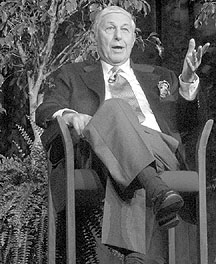
Journalism legend receives Meadows Award
Don Hewitt, respected journalist and producer of the award-winning television show “60 Minutes” received the 2002 Algur H. Meadows Award for Excellence in the Arts on Saturday at the Meadows School of the Arts. Hewitt is the 17th recipient of this award.
Prior to accepting the award, Hewitt spent three days on the SMU campus, discussing his career and journalism’s future. He joined six different journalism classes as a guest speaker and enjoyed an informal lunch followed by a question-and-answer session with journalism students. Hewitt was also interviewed for SMU-TV by SMU students.
In the evenings, Hewitt participated in two public events on campus. The first, “A Conversation With Don Hewitt,” took place Wednesday night. The second event, which was held in the Bob Hope Theatre Friday night, was a panel discussion titled “The Changing Face of Journalism: A Panel Discussion With Don Hewitt.” In addition to Hewitt, the panel included moderator Yolette Garcia, news director of KERA 90.1, Ed Bark, television critic of The Dallas Morning News and Robert Hart, director of online content for Belo Interactive’s News and Operations division.
Garcia opened up with the first question, asking Hewitt about the difference between his program and the “60 Minutes” duplicates, such as “Dateline” and “20/20.”
“We cover the times in which we live, [’60Minutes’] is more soul-searching than the others,” Hewitt said. “They aren’t serious about what they do; you can either lower your standards and do pop stars and the Osbournes, or you don’t. There’s your difference.”
However, with the changing times, it is more difficult for television shows to maintain their integrity. Reality television is becoming more prominent in today’s society, and that is a real concern for programs like “60 Minutes.” But that is no fear of Hewitt’s.
“You have to make a choice – are you going to cater to the best, or to the advertisers?” he said.
Being on campus at SMU opened Hewitt’s eyes to many things. He told the members of the panel that he learned from the [students].
“For them, newsmagazines aren’t what’s important. They don’t know, and they don’t care,” Hewitt said. “What twists today is going to turn tomorrow, and they realize that.”
But, when Hewitt was asked what new ideas he had for television, if any, he responded with not only an idea, but a solution for college level programming options.
“I think I would love to put together a staff to make a show for college age kids,” he said. “I’d put stuff in there that would help them learn about the world they’re about to enter. I’d call it ’60 Minutes Lite.'”








